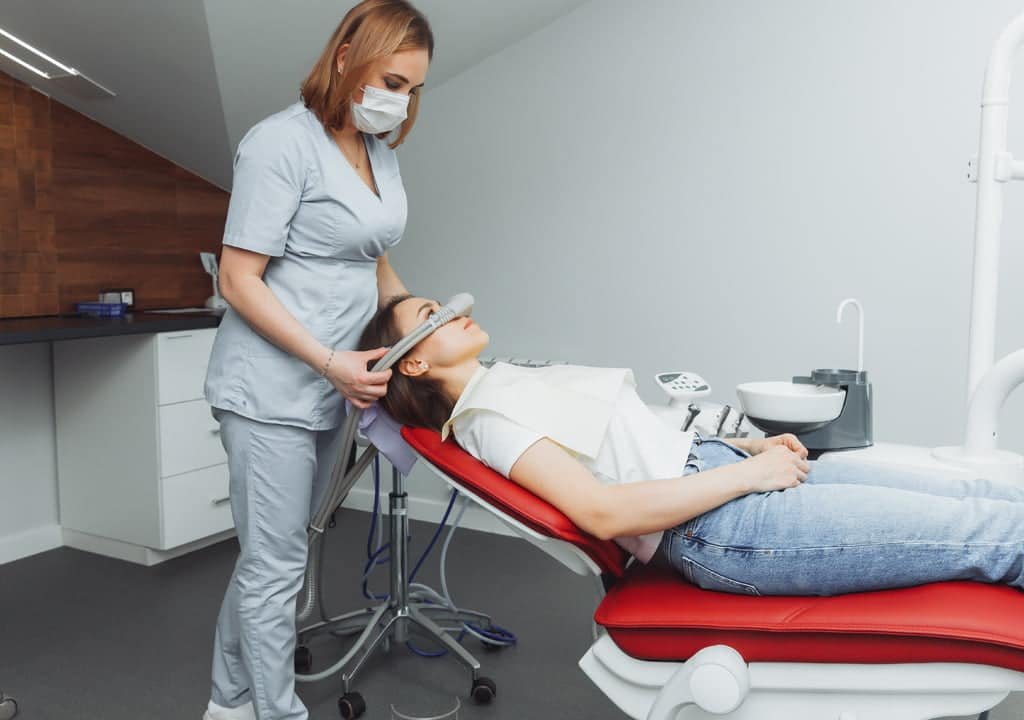Blog
What To Let Your Dentist Know Before Oral Sedation Dentistry
Introduction:
We have compiled this article on “What To Let Your Dentist Know Before Oral Sedation Dentistry”. The reference links are at the bottom of the article.
[1]What Is Sedation Dentistry?
Sedation dentistry uses medication to help patients relax during dental procedures. It’s sometimes referred to as “sleep dentistry,” although that’s not entirely accurate. Patients are usually awake with the exception of those who are under general anesthesia.
The Levels Of Sedation Used Include:
- Minimal sedation — you are awake but relaxed.
- Moderate sedation (formerly called “conscious sedation”) — you may slur your words when speaking and not remember much of the procedure.
- Deep sedation — you are on the edge of consciousness but can still be awakened.
- General anesthesia — you are completely unconscious.
What Types Of Sedation Do We Provide In Dentistry?
Inhaled Minimal Sedation
You breathe nitrous oxide — otherwise known as “laughing gas” — combined with oxygen through a mask that’s placed over your nose. The gas helps you relax. Your dentist can control the amount of sedation you receive, and the gas tends to wear off quickly. This is the only form of sedation where you may be able to drive yourself home after the procedure.
Oral Sedation
Depending on the total dose given, oral sedation can range from minimal to moderate. For minimal sedation, you take a pill. Typically, the pill is Halcion, which is a member of the same drug family as Valium, and it’s usually taken about an hour before the procedure. The pill will make you drowsy, although you’ll still be awake.
A larger dose may be given to produce moderate sedation. This is the type of anesthesia most commonly associated with sedation dentistry. Some people become groggy enough from moderate oral sedation to actually fall asleep during the procedure. They usually can, though, be awakened with a gentle shake.
Who Can Have Sedation At The Dentist’s?
Sedation is most appropriate for people with a real fear or anxiety that is preventing them from going to the dentist.
- Sedation dentistry may also be appropriate for people who:
- have a low pain threshold
- can’t sit still in the dentist’s chair
- have very sensitive teeth
- have a bad gag reflex
- need a large amount of dental work completed
Sometimes, children are given sedation if they are terrified of going to the dentist or refuse to cooperate during the visit. Nitrous oxide tends to be safe in children, and just about any dentist can administer it. A smaller percentage of pediatric dentists are trained to give children oral sedation. Oral sedation can be safe when kept within the recommended dose for the child’s age and weight.
[2]When Is Sedation Required?
During dental procedures, sedation is required. Sedation will make sure that your child doesn’t experience pain during the procedure.
It’s sometimes required for those with special needs or behavioral disorders. The experience can be stressful to them and sedation can help calm them down.
Depending on your child’s level of anxiety, sedation might be required. For children that experience higher levels of phobias or anxiety, then a higher level of sedation might be given.
Sedation Defined
Dental anesthesia and sedation varies from mild to full sedation. Mild sedation means that the child is relaxed but awake.
Moderate sedation is where your child might start slurring their words when they speak. After the procedure, they might not remember what they said.
Full sedation is when your child is unconscious during the procedure. Deep sedation is when they’re aware but barely conscious.
When Do I Contact The Dentist?
Sedation is generally safe, but there are certain times that you’ll want to contact your dental office. If your child experiences excessive bleeding, pain, vomiting, or a fever, you’ll want to contact their dental office.
Can All Dentists Perform Sedation?
While many dentists can perform mild to moderate sedation, only a small number of dentists can perform full or deep sedation. Many dentists who perform deep or full sedation tend to be dental anesthesiologists or maxillofacial surgeons. If your dentist provides deep or full sedation, many states will require them to have a certification to do this.
Is Sedation Dentistry Safe?
When sedation dentistry is performed by qualified dentists, it’s safe. Explore your dentist’s qualifications and see how many sedation procedures they’ve performed. Your dentist will take your child’s health, weight, and age into account before providing sedation.
Let your dentist know about any medications or medical procedures that your child has. Speak with your dentist about any risks of sedation in advance and any questions that you have.
Conclusion:
Thank you for reading this article, and check back frequently for other dental health articles. Should you have any questions, please contact Apple Tree Dental today!
Article compiled by Apple Tree Dental
Article reference links


